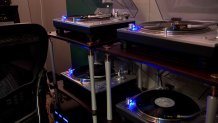Baylor University is working to preserve history. The focus is music and the spoken word. NBC 5’s Noelle Walker takes us to the Black Gospel Archive in Waco.
Tucked in the corner of a library on the Baylor University campus in Waco, the Black Gospel Archive is giving old gospel recordings new life.
"I had absolutely no exposure to gospel music when I started working here," Black Gospel Archive Audio Digitization Specialist Hannah Engstrom said. "You know, I can hear how the music influenced rock 'n' roll, jazz, blues, pop, country music, folk music."
Watch NBC 5 free wherever you are
Engstrom spends her days in a closet-sized room, cleaning old records, digitizing them 4-at-a-time, and preserving them in photo and digitized form for future generations to enjoy.

Get top local stories in DFW delivered to you every morning with NBC DFW's News Headlines newsletter.
"This is basically the history of gospel music in sound," Baylor University Professor of Music Stephen Newby said. "It helps to inform scholarship, it preserves legacies, and it celebrates African American history."
The Black Gospel Archive room is lined with albums, cassettes, and posters. There are more than 8,000 physical albums that can be touched and listened to by visitors. The online archive has more than 66,000 tracks and counting.
"It's an important genre. It's not being collected by any other university, any other institution, across the United States. It's an underrepresented minority, and so this music not only represents a culture, but also represents the civil rights that they've been fighting for for decades at this point. So it's a very important genre, but also a very important piece of American history," Black Gospel Archive Director Darryl Stuhr said. "This music is disappearing, and we risk losing this piece of American history."
Local
The latest news from around North Texas.
That's because some of the music was regional, with small distributions. Some of it gets thrown away without knowing the value of it.
"You're touched by a lot of the music," Stuhr said. "And every once in a while we come across a piece and everything has to stop, and we all just have to go in there and listen!"
A $2.48 million grant from the Lilly Endowment Inc. will expand the archive listening center, as well as add classroom space, adding an educational element to the collection.
"When we see the music of today; rap and hip hop, it is an extension of gospel through pop music, through R&B, through jazz. To better understand where we're going as human beings, we should engage with our history and with our past," Newby said. 'So the archives are critical in telling the journey of African Americans depending on God, depending on community, and having the power to sing praise, even through lament."



